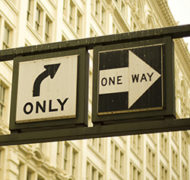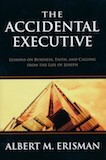Making Decisions that Keep Work and Life in Balance: Preparing to Be Wrong
Blog / Produced by The High Calling
We had talked about it for months: a new electronic publication for employees. Only two companies in North America had one at the time, one in the U.S. and one in Canada. We had talked with both, and the one in Canada was our best analogy—no standardized platform for employees to read it, people scattered across several countries, and uncooperative technical staff.
We planned it, designed it, found stories for it (we still called them stories back then, not content), and staffed it.
We did three things right.
We set everyone’s mind at ease by starting small—a test group of 100. That’s what Chip Heath and Dan Heath, in Decisive: How to Make Better Choices in Life and Work, call “ooching,” or trying things on a small scale before you go all out.
The second thing we did right was to plan to be wrong. So what would happen if the email system crashed because of distributing 5,000 electronic publications? What would happen if some platforms couldn’t open the publication? What would we do if some employees decided to share it with friends, relatives, customers, competitors, and university contacts?
We worked methodically through each potential deal-breaker. We talked again with the two companies who had one, and they suggested additional potential problems that we hadn’t considered, like what if the CEO tried to open the publication and it crashed his desktop? (That had happened to one of them.)
We worked with two outside developers, and what we couldn’t test ourselves, they tested for us.
And third, we did something the Heaths call “book-ending” but we called scenario planning. We asked ourselves: what were the best and worst possibilities, and what could we live with? How would we define success? What if things started well and then fell back; how would we know? What if things looked like they might fail—how would we react?
One thing we never did was to stop. We believed in the project enough that we kept moving forward, all the while anticipating being wrong.
We launched the publication. The email system survived. The publication opened on every desktop platform. The CEO’s copy opened, too. And people did email it outside the company, which we decided would be a good thing and had the stories cleared with that expectation.
For the next six years, the publication won the hearts and minds of the employees. People felt the stories we included helped bring balance and value to their life and work. It was written, the CEO himself said, “as if we thought employees were intelligent human beings.” In its first year, the publication changed the internal status quo, opening employees (and management) to opportunities that simply weren’t on the radar scope before.
Did I mention this was 1994, when the worldwide web was barely getting underway and hardly anyone had online experience?
“Being decisive is itself a choice,” the Heaths say. “Decisiveness is a way of behaving, not an inherited trait. It allows us to make brave and confident choices, not because we know we’ll be right but because it’s better to try and fail than to delay and regret.”
We were determined to try, and we did. The project succeeded beyond anyone’s wildest expectations (we blew right through the book-ends). We had no regrets, because there were none to be had.
Even if we had failed, we knew then it was always better to try than to retreat into safety.
And we knew this, too: planning to be wrong would anticipate crises—helping us to avoid them and keeping the rest of our lives in balance.
On Mondays in June we’ve been discussing Chip and Dan Heath’s book Decisive: How to Make Better Choices in Life and Work. Join us next week as we begin our July book discussion on The Sabbath World: Glimpses of a Different Order of Time by Judith Shulevitz. Order your book and join us in July!
Also, we've been giving away two copies of network member Billy Coffey's new novel When Mockingbird's Sing each week of our June book club! Just leave a comment to be entered to win. Winners will be announced in next week's book club post. The winners of last week's drawing are Stephani Cochran and Sheila Seiler Lagrand. Congratulations!
Click the graphic to read more great articles in the Work-Life Balance series.






